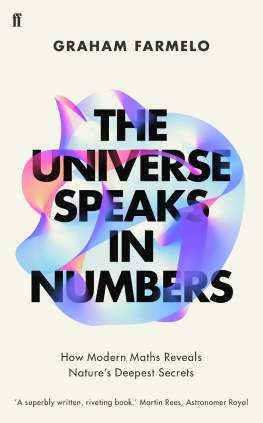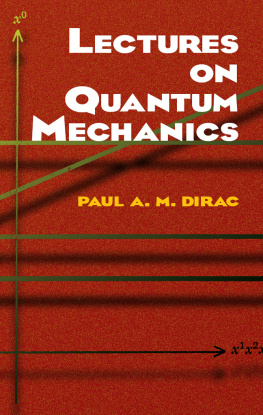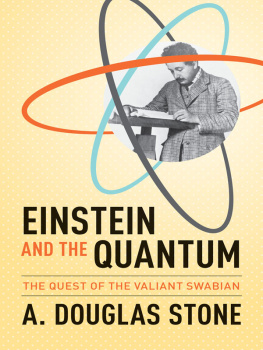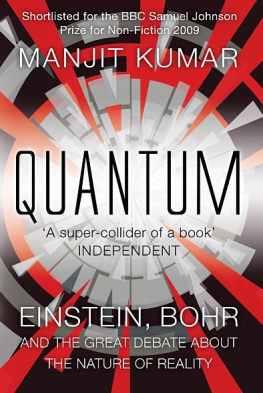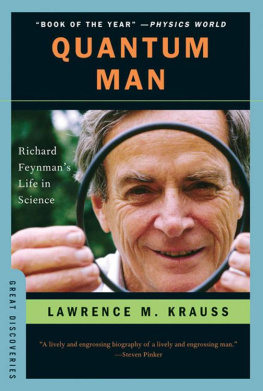[T]he amount of eccentricity in a society has generally been proportional to the amount of genius, mental vigour, and moral courage which it contained. That so few now dare to be eccentric, marks the chief danger of the time.
JOHN STUART MILL , On Liberty, 1869
We are nothing without the work of others our predecessors, others our teachers, others our contemporaries. Even when, in the measure of our inadequacy and our fullness, new insight and new order are created, we are still nothing without others. Yet we are more.
J. ROBERT OPPENHEIMER , Reith Lecture, 20 December 1953
[A] good deal of unkindness and selfishness on the part of parents towards children is not generally followed by ill consequences to the parents themselves. They may cast a gloom over their childrens lives for many years.
SAMUEL BUTLER , The Way of All Flesh, 1903
All it took was a single glass of orange juice laced with hydrochloric acid. A few minutes later, it was clear that his digestive problems were due to a chronic deficiency of stomach acid. For months, he had been admitted to hospital every few weeks to be fed vitamins intravenously, but the doctors had no idea why his digestion was so poor. Now, following the orange-juice experiment, a laboratory test on the chemical contents of his stomach confirmed the conclusion that his stomach contained far too little acid. The simple prescription of a pill to be taken after every meal ended almost eight decades of digestive problems. As a result, Kurt Hofer, the friend who suggested the experiment and made the correct diagnosis, became the reluctant health guru to Paul Dirac, one of the most revered and strangest figures in the history of science.
Hofer and Dirac both worked at Florida State University but otherwise appeared to have little in common. Hofer just over forty years of age was a top-drawer cell biologist, a spirited raconteur who told all comers of his early family life among Austrian mountain farmers and his moment of cinematic glory as a well-paid extra in The Sound of Music. Hofers eyes glittered when he told his stories, his thickly accented voice swooped and surged for emphasis, his hands chopped and shaped the air as if it were dough. Even in this lively company, Dirac was unresponsive, speaking only when he had a pressing question to ask or, less often, a comment to make. One of his favourite phrases was: There are always more people who prefer to speak than to listen.
Dirac was one of the pre-eminent pioneers of quantum mechanics, the modern theory of atoms, molecules and their constituents. Arguably the most revolutionary scientific breakthrough of the
The ambitions of Kurt Hofer were more modest than Diracs. Hofer had made his name in cancer and radiation research by carefully carrying out experiments and then trying to find theories to explain the results. This was the conventional, bottom-up technique of the English naturalist Charles Darwin, who saw his mind as a machine for grinding general laws out of large collections of facts. Dirac, a classic example of a top-down thinker, took the opposite approach, viewing his mind as a device for conjuring laws that explained experimental observations. In one of his greatest achievements, Dirac used this method to arrange what had seemed an unlikely marriage between quantum mechanics and Einsteins theory of relativity in the form of an exquisitely beautiful equation to describe the electron. Soon afterwards, with no experimental clues to prompt him, he used his equation to predict the existence of antimatter, previously unknown particles with the same mass as the corresponding particles of matter but with the opposite charge. The success of this prediction is, by wide agreement, one of most outstanding triumphs of theoretical physics. Today, according to the cosmologists standard theory of the early universe supported by a wealth of observational evidence antimatter made up half the material generated at the beginning of the Big Bang; from this perspective, Dirac was the first person to glimpse the other half of the early universe, entirely through the power of reason.
Hofer liked to compare Dirac with Darwin: both English, both uncomfortable in the public eye, both responsible for changing the way scientists think about the universe. A decade before, Hofer was
Around 1978, Hofer and his wife Ridy began to pay visits to the Diracs on most Friday afternoons, to wind down for a couple of hours after the weeks work. The Hofers set off from their home near the campus in Tallahassee at about 4.30 p.m. and took the two-minute walk to 223 Chapel Drive, where the Diracs lived in a modest, single-storey house, a few paces from the quiet residential street. At the front of the house was a flat, English-style lawn, planted with a few shrubs and a Pindo palm tree. The Hofers were always welcomed warmly by Diracs smartly dressed wife Manci, who laughed and joked as she dispensed sherry, nuts and the latest faculty gossip. Dirac was painfully spare and round-shouldered, dressed casually in an open-necked shirt and an old pair of trousers, content to sit and listen to the conversation around him, pausing occasionally to sip his glass of water or ginger ale. The chatter ranged widely from family matters to local politics at the university, and from the earnest utterances of Mrs Thatcher on the steps of Downing Street to the most recent sermon from Jimmy Carter in the White House garden. Although Dirac was benign and receptive during these conversations, he was so reserved that Hofer often found himself trying to elicit a response from him a nod or a shake of the head, a few words, anything to make the conversation less one-sided. Just occasionally, Dirac would be moved to contribute a few words about one of his private enthusiasms Chopins waltzes, Mickey Mouse and any television special featuring Cher, the brassy chanteuse.
During the first two years or so of these visits, Dirac showed no sign of wanting to talk about himself or of having any deep feelings, so Hofer was ill prepared when, one Friday evening in the spring of 1980, Diracs vacuum-packed emotions burst into the open. I remember it well. It was pretty much like all my other visits except that I was alone, Hofer says. My wife decided not to come as she was tired, heavily pregnant with our first child. At the beginning of the visit, Dirac behaved normally and looked alert and ready to absorb the conversations around him. After the customary pleasantries, the Diracs took Hofer by surprise when they ushered him through the formal front room where they always talked during their Friday chats to the less formal family room at the rear of the house, adjoining the kitchen and overlooking the garden. The Diracs pre-war taste was reflected in the decor of this room, dominated by the wood of the floorboards, the panelling on all four walls, and the huge 1920s sideboard covered with framed photographs of Dirac in his prime. A mock-Baroque chandelier hung from the ceiling and, on most of the walls, there were paintings with no trace of modernity.
As usual, Manci and Hofer chatted convivially while the frail Dirac sat motionless in his favourite old chair, occasionally looking through the glass sliding doors to the garden. For the first half an hour or so of the conversation, he was, as usual, mute but came vibrantly to life when Manci happened to mention his distant French ancestors. Dirac corrected one of Mancis historical facts and began to speak about his family origins and his childhood in Bristol, talking fluently in his quiet, clear voice. Like a well-rehearsed actor, he spoke confidently, in carefully articulated sentences, without pausing or correcting himself. I was startled for some reason, he had decided to take me into his confidence, Hofer says. Id never seen him talk so eloquently in private.


